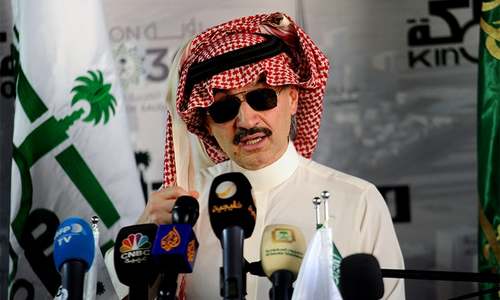Saad Hariri's resignation from Lebanon's premiership has raised fears that regional tensions were about to escalate and that the small country would once again pay a heavy price.
Analysts said the politician's move on Saturday to step down from the helm less than a year after forming a government was more than just the latest hiccup in Lebanon's notoriously dysfunctional politics.
“It's a dangerous decision whose consequences will be heavier than what Lebanon can bear,” Hilal Khashan, a professor of political science at the American University of Beirut, said.
Hariri announced his resignation in a broadcast from Saudi Arabia, accusing Iran and Hezbollah of taking over his country and destabilising the entire region.
Hezbollah is part of the government, but the clout of a group whose military arsenal outstrips that of Lebanon's own armed forces is far greater than its share of cabinet posts.
For years now, Lebanon has been deeply divided between a camp dominated by Hezbollah and a movement led by Hariri.
“Hariri has started a cold war that could escalate into a civil war, bearing in mind that Hezbollah is unmatched in Lebanon on the military level,” Khashan said.
The rift in Lebanon's political class led to the assassination in 2005 of Hariri's father Rafik, an immensely influential tycoon who made his fortune in Saudi Arabia.
Iran-Saudi flare-up
Investigations pointed to the responsibility of Syrian President Bashar al-Assad's regime and its Lebanese ally Hezbollah.
Other political assassinations in the anti-Hezbollah camp ensued, then a month-long war between the powerful militia and neighbouring Israel, as well as violent internal clashes that harked back to the dark days of the 1975-1990 civil war.
Twelve years on, Lebanese politics remain just as toxically sectarian and the threat of another flare-up very real.
Hariri even said on Saturday he feared going the way of his father.
His resignation came in a context of high tension between Saudi Arabia, once the region's powerhouse, and Iran, which has played an increasingly prominent political and military role in the region recently.
On Friday, Hariri met Iran's most seasoned diplomat, Ali Akbar Velayati, before flying to Saudi Arabia and resigning from there via a Saudi-funded television network.
“The timing and venue of the resignation are surprising... but not the resignation itself,” said Fadia Kiwane, political science professor at Beirut's Saint Joseph University.
“The situation is developing rapidly and we're at a turning point... there could be a deadly clash between Saudi Arabia and Iran,” she claimed. “In that event, the two main camps in Lebanon will clash too.”
Over the past few weeks, a Saudi minister, Thamer al-Sabhan, has unleashed virulent attacks against Hezbollah on social media.
New war with Israel?
“The terrorist party should be punished... and confronted by force,” he wrote last month.
Other than just an internal conflict, analysts also do not rule out an external attack on Hezbollah, be it by Saudi Arabia directly or by the militia's arch-foe, Israel.
“Hariri is saying 'there is no government any more, Hezbollah is not part of it'... and he is thus legitimising any military strike against Hezbollah in Lebanon,” Khashan claimed.
Israel and Hezbollah fought a devastating war in 2006, and Israeli politicians have ramped up the rhetoric lately, warning that its military was prepared for war with Lebanon.
Any new war damaging key infrastructure would have a disastrous impact on a country already weakened by ballooning debt, corruption and the demographic pressure from a massive influx of Syrian refugees.
As soon as the news of Hariri's resignation broke, many Lebanese took to social media to voice their fears of a return to violence.
“After Hariri's resignation, a war will be launched against Lebanon,” wrote one of them, Ali Hammoud, on Twitter.
On the streets of Beirut, even those who had little sympathy for Hariri expressed concern.
“We're headed for the worst,” said one shop owner.














































